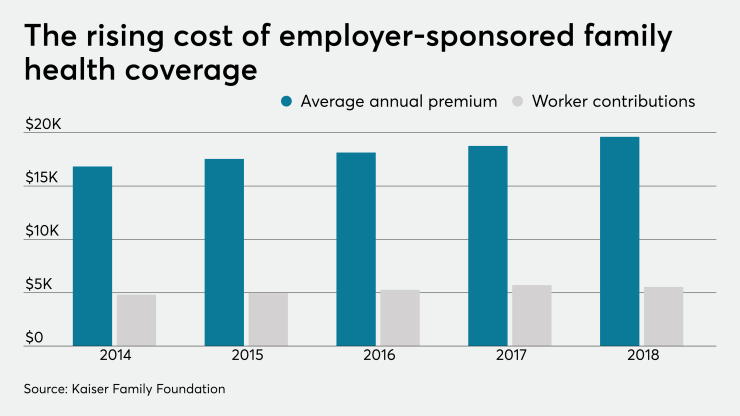Healthcare and wellness budgets are expected to increase this year, as employers anticipate tackling rising healthcare costs.
More than 80% of employers say they are planning to increase their health and wellness spending this year. This number is more than double compared with those employers citing increases in 2009 (34%), according to Optum’s newly released annual Wellness in the Workplace study.
The study dovetails with recent findings from the
In addition to boosting health and well-being budgets, the healthcare services company found employers are also expecting to further embrace digital tools to combat costs and increase employee engagement in their health plans. Since 2016, the proportion of employers using health-related mobile apps rose by 46%, with now close to three-quarters of respondents reporting that the apps helped increase employee participation, according to the report.
See also:
Additionally, the number of employers with wellness programs which include the use of fitness or activity devices increased by nearly 40% over the same time period, with 71% of employers reporting successful engagement by their employees.
“Employers’ interest in well-designed, comprehensive health and wellness programs that use the latest digital tech has dramatically increased over the last decade,” says Seth Serxner, chief health officer at Optum.
The increased investment comes as workers continue to look to employers for help in addressing their personal health and wellness. More than twice as many employers say workplace well-being programs are more important to their employee benefits mix than they were a decade ago (33% in 2009 to 77% in 2018), according to the report.
“We’ve also seen an evolution in the reasons for offering health and well-being programs with employers saying these initiatives are just as important in attracting and retaining employees as addressing healthcare costs,” Serxner adds.
See also:
Behavioral health also remains a top concern for employers, Optum finds. Nearly all employers say they plan to reduce the stigma surrounding mental health. A majority express concern about substance use disorders and access to behavioral health services.
While the percentage of employers saying they offer wellness programs to reduce long-term healthcare costs has stayed relatively steady over the last 10 years (around 80%), other factors such as improving absenteeism/presenteeism, attracting and retaining talent and improving employee morale, are now viewed as equally important.






